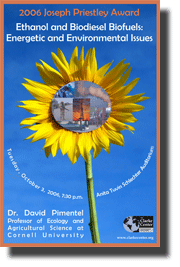Tuesday, October 3, 2006
Ethanol and Biodiesel Biofuels: Energetic and Environmental Issues
Anita Tuvin Schlechter Auditorium, 7:30 p.m.

Issue in Context
Though the U.S. has less than 4% of the world’s population, it is responsible for 22% of the carbon dioxide released worldwide from the burning of fossil fuels. The release of carbon dioxide is the greatest contributor to global warming. The high energy usage of the United States makes alternative energy sources essential in reserving the pollution and dependence on fossil fuels. Ethanol, an energy source derived from corn, soybeans, and switch grass, has been touted as a clean alternative to fossil fuel. However, the production of ethanol requires a lot of energy – through farming and harvesting to deriving ethanol. The fuel used to produce it may be more than the energy it provides.
About the Speaker
David Pimentel is a professor of Ecology and Agricultural Science at Cornell University . His research includes population ecology, biological control, biotechnology, sustainable agriculture, land and water conservation, and environmental policy. Pimentel has served on many national and government committees including the National Academy of Sciences, the President’s Science Advisory Council, the U.S. Department of Energy, and the U.S. State Department. He earned his Ph.D. at Cornell University and did his postdoctoral study at Oxford University and the University of Chicago.
Related Links
David Pimentel’s “Biomass for biofuel isn’t worth it”
American Coalition for Ethanol
Renewable Fuels Association
Businessweek’s Ethanol: Myths and Realities
Slate’s Corn Dog: The Ethanol Subsidy is Worse Than You Can Imagine
